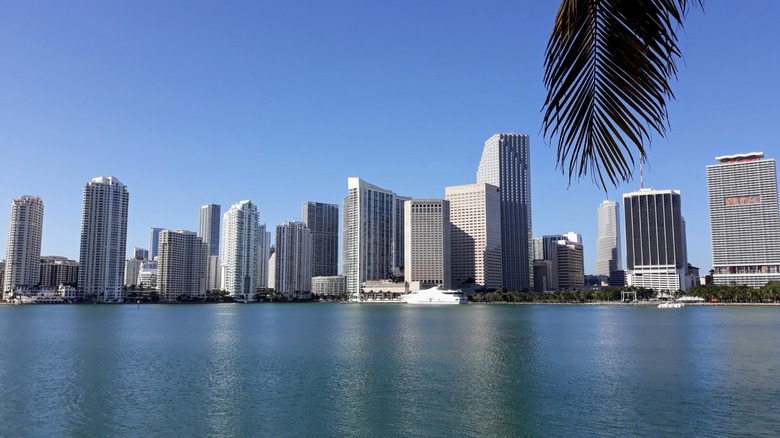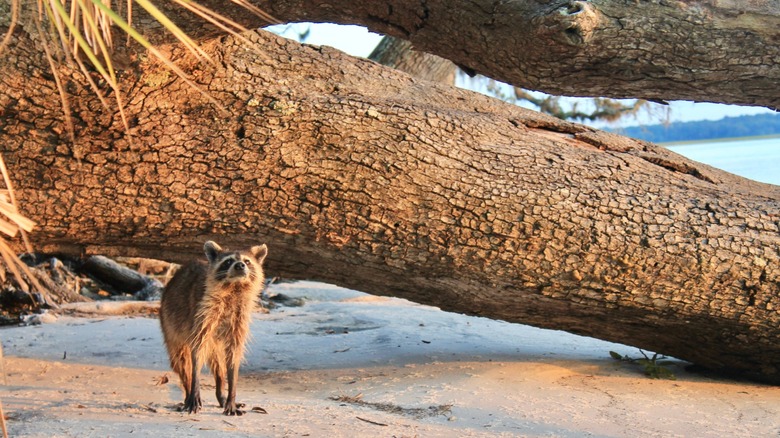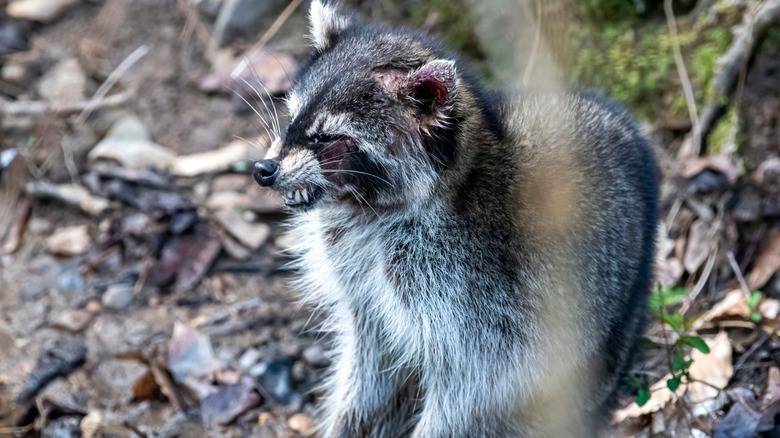Tucked Into Florida's Biscayne Bay Is A Wildlife Island With Adorable Residents You Must Book A Tour To Meet
Picture the scene. You head to the curb to throw out the day's trash, lift the lid, and find a nursery of raccoons having a garbage party. "Mind your business," they seem to utter, as you promptly close the lid and back away. While alarming, it's not an uncommon turn of events to encounter raccoons raiding the trash. What is surprising is finding them on a beautiful wildlife island off the coast of Miami.
Fittingly nicknamed Raccoon Island (also known as Sandspur Island), the 15-acre raccoon sanctuary is nestled in the northern corner of Biscayne Bay in Miami, which is a bustling hub for recreation, dining, and wildlife education. You'll also find Haulover Sandbar there, one of the best sandbars in America. The bay is truly beautiful, and although it isn't altogether clear how the raccoons came to be on the island, they seem to agree. The estimated 40 to 60 raccoons live peacefully on the island, and contrary to the popular belief that raccoons are solely nocturnal, can be out and active during the day. When you arrive, watch and interact with these adorable creatures as they charm you with their playful antics. Aside from boating there yourself, booking a tour is the only way to get there. Tours depart from Miami Beach and take a scenic journey to the island via kayak, paddleboard, or boat.
Getting to Raccoon island and meeting its surprising inhabitants
Getting to Raccoon Island adds to the charming excursion. Booking a tour with Aquarius Boat Tours grants you a three-hour journey through the sparkling bay and passes by Millionaire's Row, where glamorous mansions such as the Mediterranean-inspired Vizcaya Mansion and Gardens stand. Soflo Water Adventures offers another tour with kayaks and paddleboards. Dolphins can be spotted, and you'll get to paddle beneath a tangled canopy of mangrove trees. These tours are around $100 per person, or you can book a private cabin cruiser with Miami Ocean Tours and can split $399 with up to six people.
Arriving on Raccoon Island dispels the myth that they are feral, rabid creatures. Raccoons there meet guests with curiosity and friendliness without a single report of a bite. Some say that the raccoons go wild over shrimp but that they fight each other over it — not you. Others lounge in trees or wait politely for slices of melon. Their ability to stand on their hind legs and their extremely nimble paws are fascinating to observe. Raccoon Island isn't dangerous, like the five most alligator-infested destinations in Florida, but the island and its inhabitants should still be approached with caution.
Don't approach the raccoons if they are behaving aggressively or otherwise abnormally. Yet, they aren't known to clamor and will win you over with their watchful little faces and patience. Try not to drop your offerings into the sand, as raccoons have fastidious eating habits and appear to prefer their food debris-free. Visitors to the island have also noticed how thirsty the raccoons seemed, so bringing fresh water for them may be greatly appreciated.
Caveats to visiting Racoon Island and facts about raccoons you may not know
While the fear of rabies may deter a visit to Raccoon Island, the largest risk is to the animals themselves — the draw of tasty snacks brings all of the raccoons together, which could hasten the spread of any introduced diseases and lead to their deaths. What's more, regularly being fed by humans teaches raccoons to lose their fear of people, and they could become aggressive when not receiving the food they have come to expect.
Other displays of abnormal raccoon behavior are even more alarming. If an adult raccoon appears to be walking in an unstable manner or seems excessively sluggish, that may indicate it is unwell. Rabies is one disease that may cause raccoons to behave that way, and distemper is another. While distemper isn't transferable to humans, raccoons suffer severe physical distress after contracting it, and then often die.
Raccoons typically avoid confrontation and will only become aggressive if they feel threatened or cornered. It should be easy not to corner the furry residents while visiting Raccoon Island. However, tourists have noticed trash left behind on the island, such as plastic packaging and cans. And while raccoons are extremely adaptable and are omnivores, it's important to help preserve the natural environment and help maintain the integrity of this unique and magical experience.


